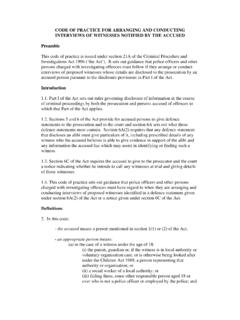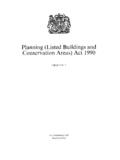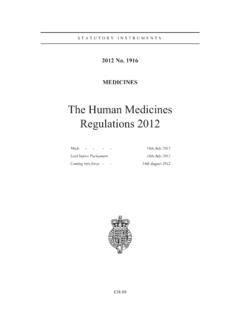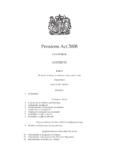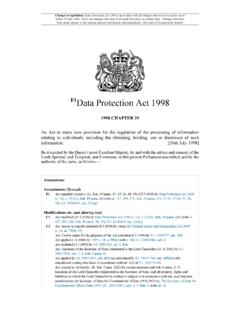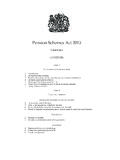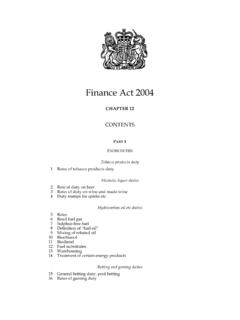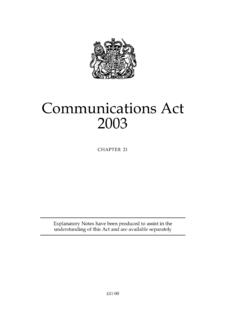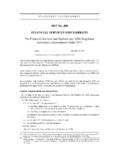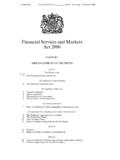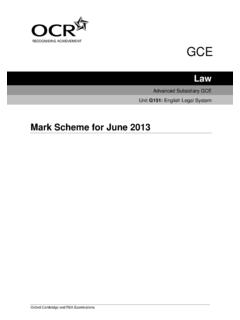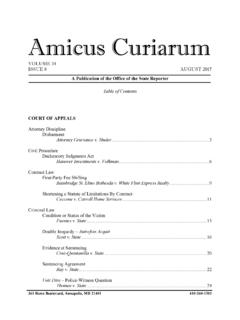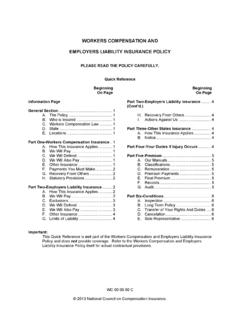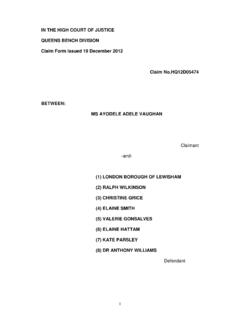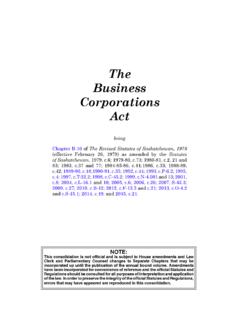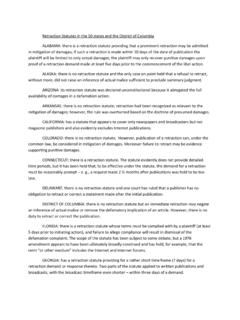Transcription of Defamation Act 2013 - Legislation.gov.uk
1 Defamation Act 2013 . CHAPTER 26. Explanatory Notes have been produced to assist in the understanding of this Act and are available separately Defamation Act 2013 . CHAPTER 26. CONTENTS. Requirement of serious harm 1 Serious harm Defences 2 Truth 3 Honest opinion 4 Publication on matter of public interest 5 Operators of websites 6 Peer-reviewed statement in scientific or academic journal etc 7 Reports etc protected by privilege Single publication rule 8 Single publication rule Jurisdiction 9 Action against a person not domiciled in the UK or a Member State etc 10 Action against a person who was not the author.
2 Editor etc Trial by jury 11 Trial to be without a jury unless the court orders otherwise Summary of court judgment 12 Power of court to order a summary of its judgment to be published Removal, etc of statements 13 Order to remove statement or cease distribution etc ii Defamation Act 2013 (c. 26). Slander 14 Special damage General provisions 15 Meaning of publish and statement . 16 Consequential amendments and savings etc 17 Short title, extent and commencement ELIZABETH II c. 26. Defamation Act 2013 . 2013 CHAPTER 26. An Act to amend the law of Defamation .
3 [25th April 2013 ]. B E IT ENACTED by the Queen's most Excellent Majesty, by and with the advice and consent of the Lords Spiritual and Temporal, and Commons, in this present Parliament assembled, and by the authority of the same, as follows: . Requirement of serious harm 1 Serious harm (1) A statement is not defamatory unless its publication has caused or is likely to cause serious harm to the reputation of the claimant. (2) For the purposes of this section, harm to the reputation of a body that trades for profit is not serious harm unless it has caused or is likely to cause the body serious financial loss.
4 Defences 2 Truth (1) It is a defence to an action for Defamation for the defendant to show that the imputation conveyed by the statement complained of is substantially true. (2) Subsection (3) applies in an action for Defamation if the statement complained of conveys two or more distinct imputations. (3) If one or more of the imputations is not shown to be substantially true, the defence under this section does not fail if, having regard to the imputations which are shown to be substantially true, the imputations which are not shown to be substantially true do not seriously harm the claimant's reputation.
5 (4) The common law defence of justification is abolished and, accordingly, section 5 of the Defamation Act 1952 (justification) is repealed. 2 Defamation Act 2013 (c. 26). 3 Honest opinion (1) It is a defence to an action for Defamation for the defendant to show that the following conditions are met. (2) The first condition is that the statement complained of was a statement of opinion. (3) The second condition is that the statement complained of indicated, whether in general or specific terms, the basis of the opinion. (4) The third condition is that an honest person could have held the opinion on the basis of.
6 (a) any fact which existed at the time the statement complained of was published;. (b) anything asserted to be a fact in a privileged statement published before the statement complained of. (5) The defence is defeated if the claimant shows that the defendant did not hold the opinion. (6) Subsection (5) does not apply in a case where the statement complained of was published by the defendant but made by another person ( the author ); and in such a case the defence is defeated if the claimant shows that the defendant knew or ought to have known that the author did not hold the opinion.
7 (7) For the purposes of subsection (4)(b) a statement is a privileged statement if the person responsible for its publication would have one or more of the following defences if an action for Defamation were brought in respect of it . (a) a defence under section 4 (publication on matter of public interest);. (b) a defence under section 6 (peer-reviewed statement in scientific or academic journal);. (c) a defence under section 14 of the Defamation Act 1996 (reports of court proceedings protected by absolute privilege);. (d) a defence under section 15 of that Act (other reports protected by qualified privilege).
8 (8) The common law defence of fair comment is abolished and, accordingly, section 6 of the Defamation Act 1952 (fair comment) is repealed. 4 Publication on matter of public interest (1) It is a defence to an action for Defamation for the defendant to show that . (a) the statement complained of was, or formed part of, a statement on a matter of public interest; and (b) the defendant reasonably believed that publishing the statement complained of was in the public interest. (2) Subject to subsections (3) and (4), in determining whether the defendant has shown the matters mentioned in subsection (1), the court must have regard to all the circumstances of the case.
9 (3) If the statement complained of was, or formed part of, an accurate and impartial account of a dispute to which the claimant was a party, the court must in determining whether it was reasonable for the defendant to believe that publishing the statement was in the public interest disregard any omission Defamation Act 2013 (c. 26) 3. of the defendant to take steps to verify the truth of the imputation conveyed by it. (4) In determining whether it was reasonable for the defendant to believe that publishing the statement complained of was in the public interest, the court must make such allowance for editorial judgement as it considers appropriate.
10 (5) For the avoidance of doubt, the defence under this section may be relied upon irrespective of whether the statement complained of is a statement of fact or a statement of opinion. (6) The common law defence known as the Reynolds defence is abolished. 5 Operators of websites (1) This section applies where an action for Defamation is brought against the operator of a website in respect of a statement posted on the website. (2) It is a defence for the operator to show that it was not the operator who posted the statement on the website.
